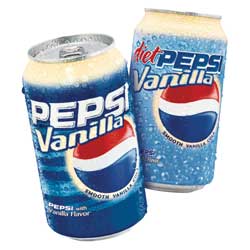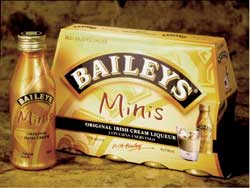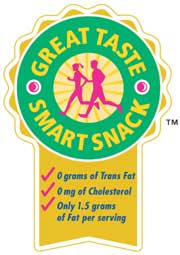
No Plain Vanilla
With the success of Coca-Cola's (Atlanta) vanilla version of its namesake cola (well over $200 million in first-year sales), it was only a matter of time before its chief rivals added such a variety to their lineups. Pepsi-Cola North America (Purchase, N.Y.) has begun national distribution of regular and Diet Pepsi Vanilla. The Pepsi products can be found initially in 20-oz. bottles, 2-liter bottles and 12-pack cans, with 24-pack cubes expected soon.The products will be “broadly targeted to teens and adults,” notes the company, but Pepsi's venture into vanilla comes on the heels of news about Vanilla Coke's decline. Some estimates put the year-versus-year sales decline at 66% in retail channels.
These results have some analysts rethinking the notion of line extensions as a means of driving long-term sales of carbonated beverages. After studying line extensions, particularly Vanilla Coke, Credit Suisse First Boston analyst Andrew Conway reported, “The brand's inability to expand the category casts doubt on whether innovation is an effective means of accelerating carbonated soft-drink growth.”

Potent Portables
The convenience craze has hit the alcohol sector, as Diageo (Stamford, Conn.) has launched Minis, 100mL, single-serve versions of Bailey's Original Irish Cream.Marking the first time the U.S. has seen this product in a single-serve format, Bailey's Minis can be found in four packs “suitable for the refrigerator door.” Boasting the same flavor characteristics as Bailey's Original Irish Cream, the Minis retain the same blend of Irish whiskey and fresh double cream as their larger sibling, and four packs will retail for a suggested $13.99.
“Current trend research indicates that consumers are looking for products that simplify their lives and offer convenience. This is evidenced by the proliferation of single-serve products within food and beverage,” noted Rebecca Henley, Bailey's brand manager. “The convenience Bailey's Minis offers, coupled with its casual, everyday positioning, will bring Bailey's into any occasion, throughout the year.”

Taking a Ribbon
The route to healthful products now has a signpost, at least on snack products from Frito-Lay (Plano, Texas). The company's most-healthful snacks will boast a new on-pack ribbon label, dubbed the Smart Snack ribbon.The snack giant worked with health expert Dr. Kenneth Cooper to develop the logo's criteria. Among the guidelines necessary for a Frito-Lay product to gain the Smart Snack logo are: 150 calories or fewer; less than 35% of calories from fat (usually 5g or less); less than 7% of calories from saturated fat (usually 1g or less); zero grams of trans fats and 240mg of sodium or less per 1-oz. serving.
The move is another in Frito-Lay's efforts to improve the healthfulness of its snacks. Earlier this year, the company announced it would eliminate partially hydrogenated cooking oils from its Doritos, Tostitos and Cheetos brands, opting instead to make these (as well as Lay's and Ruffles potato chips) with trans-fat-free oils.
Searching for the Elusive Vegetarian Oyster
Tinkering with ways to mass-produce seaweed, a fish farm in Scourie, Scotland, has discovered that the “vegetarian oyster” could be “the next big thing” in the seafood industry.Loch Duart, the salmon-farming firm, is investigating how to produce enough seaweed to export to restaurants across Europe and Japan. Though cursed with a rubbery appearance, the plant product is supposedly similar in taste to the expensive oyster.
Nick Joy, the farm's managing director, notes that seaweed is packed with vitamins and minerals, and it has a “very sea-y taste, a bit like an oyster.”
Joy hopes to expand seaweed production to roughly 200 tons annually within the next four years, so that it may export abroad. Plans for mass-production, however, are still in an early stage, due to the difficulties of cultivating it in bulk.